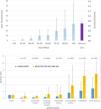Little is known regarding the relevance of racial/ethnic background to the risk for COVID-19 infection, particularly in Europe. We evaluated the risk of COVID-19 among migrants from different areas of the world within the context of universal free access to medical care.
Materials and methodsWe conducted a population-based cohort analysis of the cumulative incidence of PCR-confirmed COVID-19 among adult residents of Alcorcon (Spain) in the first wave of the disease up to April 25, 2020.
ResultsThe crude cumulative incidence among migrants (n = 20419) was higher than among Spaniards (n = 131599): 8.81 and 6.51 and per 1000 inhabitants, respectively (p < .001), but differed by region of origin. As per a negative binomial regression adjusted for age and sex, relative risk (RR) for COVID-19 for individuals from Europe, Asia, or North Africa was not significantly different from Spaniards. In contrast, a markedly increased risk was found in people from Sub-Saharan Africa (RR 3.66, 95% confidence interval (CI) 1.42−9.41, p = .007), the Caribbean (RR 6.35, 95% CI 3.83−10.55, p < .001), and Latin America (RR 6.92, 95% CI 4.49−10.67, p < .001).
ConclusionsMigrants from Sub-Saharan Africa, the Caribbean, and Latin America exhibited increased risk for COVID-19 as compared to Spaniards or migrants from Europe, North Africa, or Asia. Our data suggest ethnic background may play a role in risk for COVID-19. Migrants from some areas of the world may merit closer attention for both clinical and epidemiological reasons.
Existen pocos estudios sobre el potencial papel de los orígenes raciales / étnicos en el riesgo de infección de COVID-19, particularmente en Europa. Evaluamos el riesgo de COVID-19 entre los migrantes de diferentes zonas del mundo en un contexto de acceso universal gratuito a la atención médica.
Material y métodosRealizamos un análisis de cohortes poblacional de la incidencia acumulada de COVID-19 confirmado mediante PCR entre los residentes adultos en Alcorcón (España) en la primera oleada de la enfermedad hasta el 25 de abril de 2020.
ResultadosLa incidencia acumulada bruta entre los migrantes (n = 20419) fue mayor que entre los españoles (n = 131599): 8,81 y 6,51 y por cada 1000 habitantes respectivamente (p < 0,001), pero difería según la región de origen mundial. Mediante regresión binomial negativa, ajustada por edad y sexo, los riesgos relativos (RR) para COVID-19 no fueron significativamente diferentes de los españoles para los individuos provenientes de Europa, Asia o el norte de África. Por el contrario, hubo un marcado aumento del riesgo para los del África subsahariana (RR 3,66, intervalo de confianza del 95% [IC] 1,42-9,41, p = 0,007), el Caribe (RR 6,35, 95% IC 3,83-10,55, p < 0,001) y América Latina (RR 6,92, 95% IC 4,49-10,67, p < 0,001).
ConclusionesLos migrantes procedentes del África subsahariana, el Caribe y América Latina, a diferencia de los españoles o migrantes procedentes de Europa, el norte de África o Asia, presentaron un mayor riesgo de COVID-19. Nuestros datos sugieren un papel para el origen étnico en el riesgo de COVID-19. Los migrantes de algunas zonas del mundo pueden merecer una atención más cercana tanto por razones clínicas como epidemiológicas.
Article
Diríjase desde aquí a la web de la >>>FESEMI<<< e inicie sesión mediante el formulario que se encuentra en la barra superior, pulsando sobre el candado.

Una vez autentificado, en la misma web de FESEMI, en el menú superior, elija la opción deseada.

>>>FESEMI<<<











